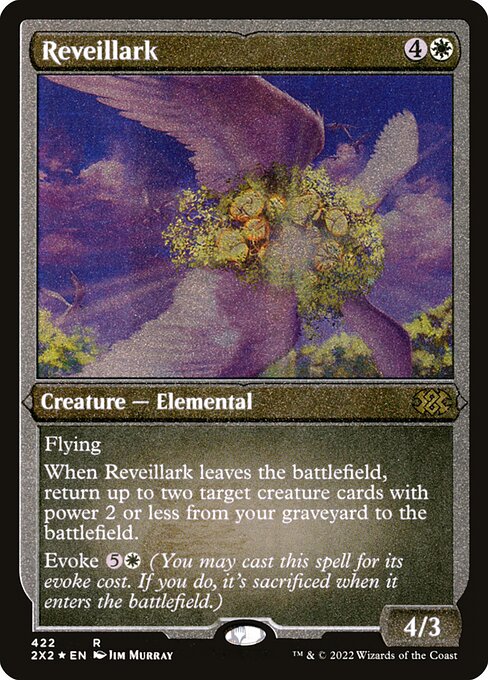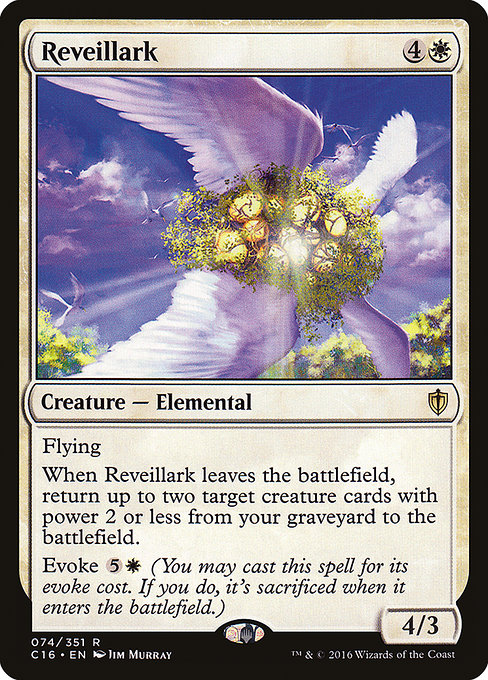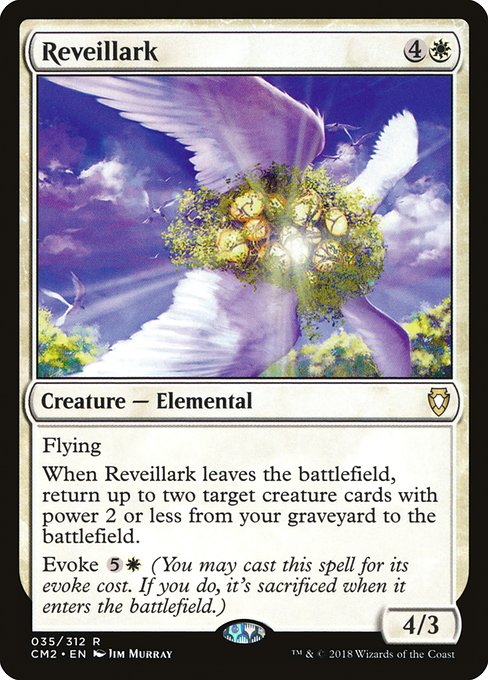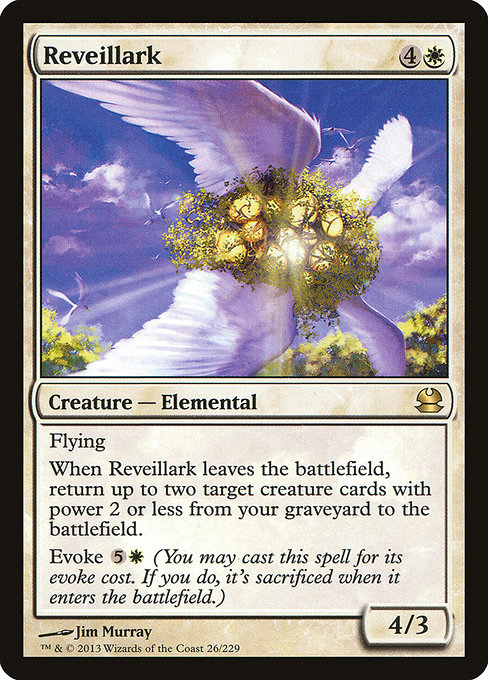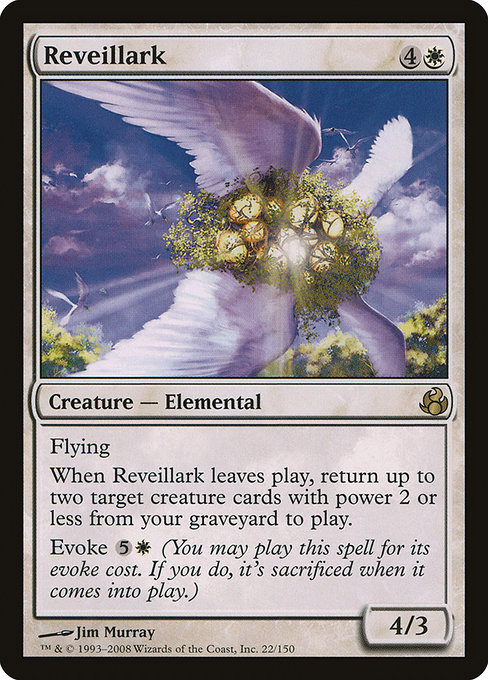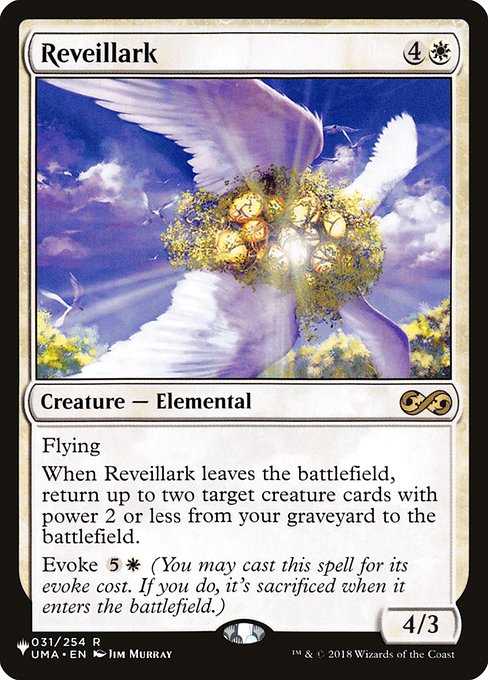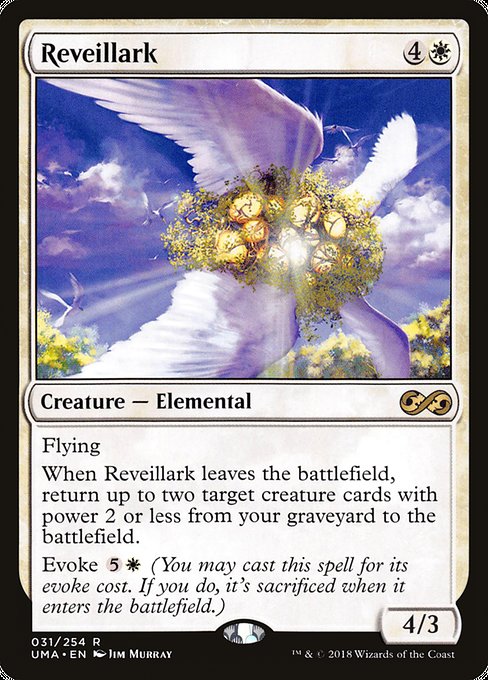Sveglialata
Creatura — Elementale
Volare
Quando la Sveglialata lascia il campo di battaglia, rimetti sul campo di battaglia fino a due carte creatura bersaglio con forza pari o inferiore a 2 dal tuo cimitero.
Apparire (Puoi lanciare questa magia pagando il suo costo di apparire. Se lo fai, viene sacrificata quando entra nel campo di battaglia.)
Quando la Sveglialata lascia il campo di battaglia, rimetti sul campo di battaglia fino a due carte creatura bersaglio con forza pari o inferiore a 2 dal tuo cimitero.
Apparire (Puoi lanciare questa magia pagando il suo costo di apparire. Se lo fai, viene sacrificata quando entra nel campo di battaglia.)
4/3
standard
future
historic
gladiator
pioneer
explorer
modern
legacy
pauper
vintage
penny
commander
brawl
alchemy
paupercommander
duel
oldschool
premodern
Rulings
If a creature spell cast with evoke changes controllers before it enters the battlefield, it will still be sacrificed when it enters the battlefield. Similarly, if a creature cast with evoke changes controllers after it enters the battlefield but before its sacrifice ability resolves, it will still be sacrificed. In both cases, the controller of the creature at the time it left the battlefield will control its leaves-the-battlefield ability.
If you’re casting a spell “without paying its mana cost,” you can’t use its evoke ability.
When you cast a spell by paying its evoke cost, its mana cost doesn’t change. You just pay the evoke cost instead.
Effects that cause you to pay more or less to cast a spell will cause you to pay that much more or less while casting it for its evoke cost, too. That’s because they affect the total cost of the spell, not its mana cost.
Evoke doesn’t change the timing of when you can cast the creature that has it. If you could cast that creature spell only when you could cast a sorcery, the same is true for cast it with evoke.
Whether evoke’s sacrifice ability triggers when the creature enters the battlefield depends on whether the spell’s controller chose to pay the evoke cost, not whether they actually paid it (if it was reduced or otherwise altered by another ability, for example).
Reveillark’s ability may target zero, one, or two creature cards in your graveyard. Each target must have power 2 or less.
If you’re casting a spell “without paying its mana cost,” you can’t use its evoke ability.
When you cast a spell by paying its evoke cost, its mana cost doesn’t change. You just pay the evoke cost instead.
Effects that cause you to pay more or less to cast a spell will cause you to pay that much more or less while casting it for its evoke cost, too. That’s because they affect the total cost of the spell, not its mana cost.
Evoke doesn’t change the timing of when you can cast the creature that has it. If you could cast that creature spell only when you could cast a sorcery, the same is true for cast it with evoke.
Whether evoke’s sacrifice ability triggers when the creature enters the battlefield depends on whether the spell’s controller chose to pay the evoke cost, not whether they actually paid it (if it was reduced or otherwise altered by another ability, for example).
Reveillark’s ability may target zero, one, or two creature cards in your graveyard. Each target must have power 2 or less.
Rulings
If a creature spell cast with evoke changes controllers before it enters the battlefield, it will still be sacrificed when it enters the battlefield. Similarly, if a creature cast with evoke changes controllers after it enters the battlefield but before its sacrifice ability resolves, it will still be sacrificed. In both cases, the controller of the creature at the time it left the battlefield will control its leaves-the-battlefield ability.
If you’re casting a spell “without paying its mana cost,” you can’t use its evoke ability.
When you cast a spell by paying its evoke cost, its mana cost doesn’t change. You just pay the evoke cost instead.
Effects that cause you to pay more or less to cast a spell will cause you to pay that much more or less while casting it for its evoke cost, too. That’s because they affect the total cost of the spell, not its mana cost.
Evoke doesn’t change the timing of when you can cast the creature that has it. If you could cast that creature spell only when you could cast a sorcery, the same is true for cast it with evoke.
Whether evoke’s sacrifice ability triggers when the creature enters the battlefield depends on whether the spell’s controller chose to pay the evoke cost, not whether they actually paid it (if it was reduced or otherwise altered by another ability, for example).
Reveillark’s ability may target zero, one, or two creature cards in your graveyard. Each target must have power 2 or less.
If you’re casting a spell “without paying its mana cost,” you can’t use its evoke ability.
When you cast a spell by paying its evoke cost, its mana cost doesn’t change. You just pay the evoke cost instead.
Effects that cause you to pay more or less to cast a spell will cause you to pay that much more or less while casting it for its evoke cost, too. That’s because they affect the total cost of the spell, not its mana cost.
Evoke doesn’t change the timing of when you can cast the creature that has it. If you could cast that creature spell only when you could cast a sorcery, the same is true for cast it with evoke.
Whether evoke’s sacrifice ability triggers when the creature enters the battlefield depends on whether the spell’s controller chose to pay the evoke cost, not whether they actually paid it (if it was reduced or otherwise altered by another ability, for example).
Reveillark’s ability may target zero, one, or two creature cards in your graveyard. Each target must have power 2 or less.
Your collection? Your decks?
Want to manage your collection and/or create decks?
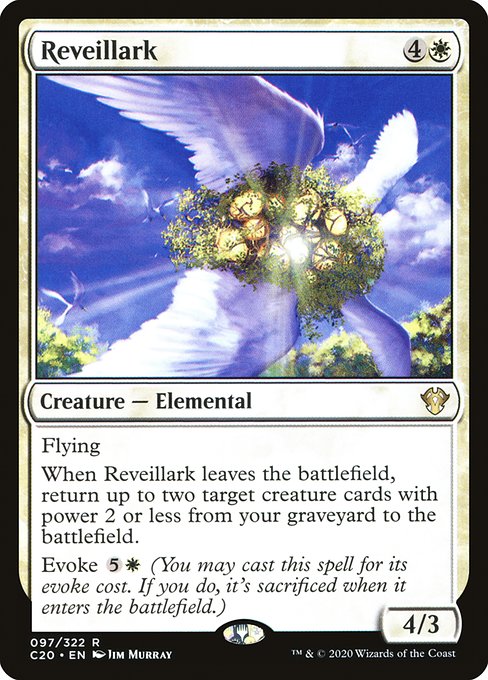

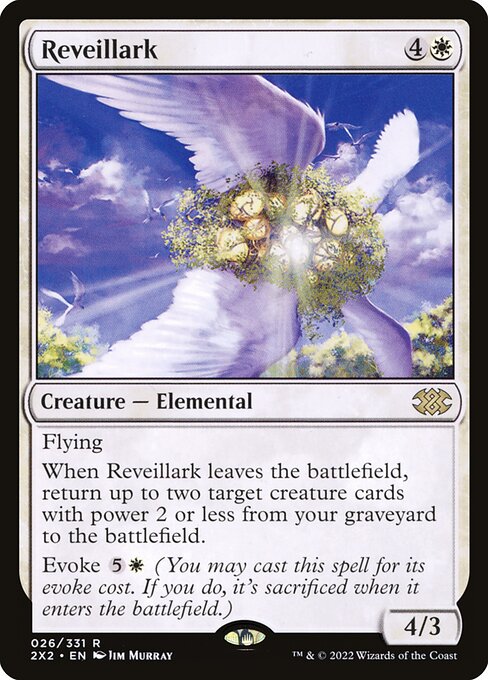
 0
0
 0.29€
0.29€
